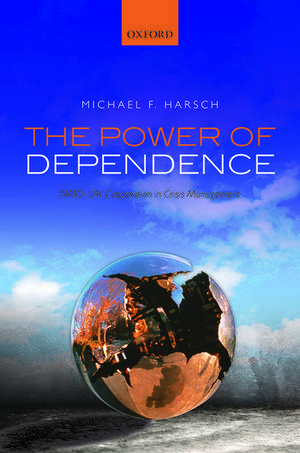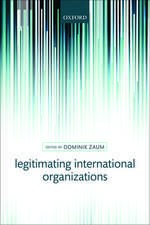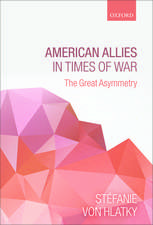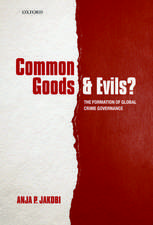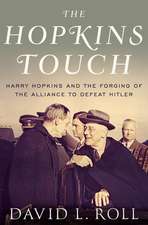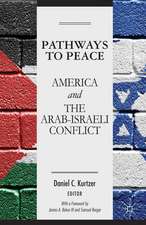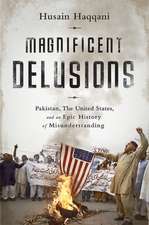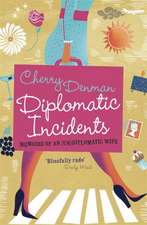The Power of Dependence: NATO-UN Cooperation in Crisis Management
Autor Michael F. Harschen Limba Engleză Hardback – 29 ian 2015
Preț: 656.47 lei
Preț vechi: 943.12 lei
-30% Nou
Puncte Express: 985
Preț estimativ în valută:
125.62€ • 134.33$ • 104.74£
125.62€ • 134.33$ • 104.74£
Carte tipărită la comandă
Livrare economică 07-14 aprilie
Preluare comenzi: 021 569.72.76
Specificații
ISBN-13: 9780198722311
ISBN-10: 0198722311
Pagini: 228
Dimensiuni: 163 x 240 x 20 mm
Greutate: 0.5 kg
Editura: OUP OXFORD
Colecția OUP Oxford
Locul publicării:Oxford, United Kingdom
ISBN-10: 0198722311
Pagini: 228
Dimensiuni: 163 x 240 x 20 mm
Greutate: 0.5 kg
Editura: OUP OXFORD
Colecția OUP Oxford
Locul publicării:Oxford, United Kingdom
Recenzii
Harsch's book is a timely and unique resource which helps bridge the gap between IR theory and organizational science. It is also a blueprint for how researchers can help effect actual political change.
Michael Harsch has written a book which is both instantly readable as well as breaking very new ground. He describes with great clarity the complex, often difficult but always important relationships between the United Nations and NATO. His analysis of the basic drivers of those relationships allows us for the first time to think carefully how we might improve them in the future. This is a true example of the value of scholarly reflection to practice.
NATO and the United Nations will again go to war together in the future. Before launching the next operation, Michael Harsch's well-researched book should be read by every diplomat, development specialist, and soldier assigned to the mission. It suggests key principles for cooperation and identifies conditions that seem to limit collaboration. I wish I had Michael's book both when I served as a military commander and as an ambassador in Afghanistan we would have done better.
The study of relationships among multilateral organizations is a research frontier in international relations and Michael Harsch is a pioneer.The Power of Dependence is a fascinating study of the conditions under which NATO and the UN cooperated, or failed to do so, on post-Cold War issues of crisis management.
The proliferation of international institutions means that many problems in today's world require cooperation not just among states but among multiple organizations with varying and sometimes overlapping missions, resources, and memberships. By examining the conditions that permit or hinder cooperation among international organizations,The Power of Dependence breaks new ground on this important topic.
An impressive book that should be widely read at the UN and at NATO. Constructed around a useful theoretical framework, it advances our understanding of what has often been a fraught relationship between these two important international organizations.
With practical studies of inter-organizational co-operation comparatively rare, Harsch's book is a timely and unique resource which helps bridge the gap between IR theory and organizational science. It is also a blueprint for how researchers can help effect actual political change.
Michael Harsch has written a book which is both instantly readable as well as breaking very new ground. He describes with great clarity the complex, often difficult but always important relationships between the United Nations and NATO. His analysis of the basic drivers of those relationships allows us for the first time to think carefully how we might improve them in the future. This is a true example of the value of scholarly reflection to practice.
NATO and the United Nations will again go to war together in the future. Before launching the next operation, Michael Harsch's well-researched book should be read by every diplomat, development specialist, and soldier assigned to the mission. It suggests key principles for cooperation and identifies conditions that seem to limit collaboration. I wish I had Michael's book both when I served as a military commander and as an ambassador in Afghanistan we would have done better.
The study of relationships among multilateral organizations is a research frontier in international relations and Michael Harsch is a pioneer.The Power of Dependence is a fascinating study of the conditions under which NATO and the UN cooperated, or failed to do so, on post-Cold War issues of crisis management.
The proliferation of international institutions means that many problems in today's world require cooperation not just among states but among multiple organizations with varying and sometimes overlapping missions, resources, and memberships. By examining the conditions that permit or hinder cooperation among international organizations,The Power of Dependence breaks new ground on this important topic.
An impressive book that should be widely read at the UN and at NATO. Constructed around a useful theoretical framework, it advances our understanding of what has often been a fraught relationship between these two important international organizations.
With practical studies of inter-organizational co-operation comparatively rare, Harsch's book is a timely and unique resource which helps bridge the gap between IR theory and organizational science. It is also a blueprint for how researchers can help effect actual political change.
Notă biografică
Michael Harsch is a faculty fellow at New York University Abu Dhabi where he teaches courses on international organizations and peacebuilding. He is also a non-resident fellow at New York University's Center on International Cooperation. His research examines international cooperation in promoting security, effective governance and development in fragile and conflict-affected countries, with a focus on Afghanistan and the Balkans.
